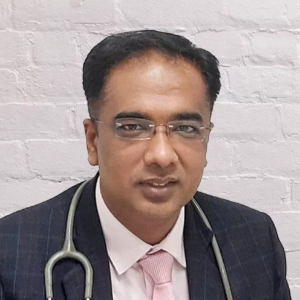Dr. Rajesh Goel
MBBS, DNB - General Medicine, DNB - Nephrology
 Nephrology
Nephrology
Dr. Rajesh Goel is currently working as a Nephrologist and a consultant in Pushpawati Singhania Research Institute, Delhi. He has attained qualification with the highest degree in medical science - MBBS and later DNB (Medicine) & DNB (Nephrology). He has achieved a fellowship program in Renal Transplant Medicines from Medanta Medicity, Gurgaon and became an active member of ISN-LM 1073. He is well experienced with Kidney Transplant, Diabetes and hypertension and kidney-related diseases.
Press Enclave Marg, Sheikh Sarai Phase II, Delhi, Delhi, India, 110017
Dr. Sandeep Sunil Singhal
DrNB Nephrology
 Nephrology
Nephrology
I am Consultant Interventional Nephrologist and Kidney Transplant Physician. I believe in providing genuine medical advise to my patients for their wellbeing. I am currently working at Sarvodaya hospital Faridabad and you can consult me online through this website.
Delhi, Delhi, India, 121004
- Delhi, Delhi
- DocIndia Verified
- 800
- Online Consultation
Dr. Uma Kishore
MBBS, MD - General Medicine
 Nephrology
Nephrology
Dr. Uma Kishore is a Nephrologist/Renal Specialist and General Physician in Darya Ganj, Delhi and has an experience of 22 years in these fields. Dr. Uma Kishore practices at Sanjeevan Hospital in Darya Ganj, Delhi and RLKC Hospital & Metro Heart Institute in Pandav Nagar, Delhi. She completed MBBS from Jawaharlal Nehru Medical College, Bhagalpur in 1999 and MD - General Medicine from Ranchi University in 2004.
24, Ansari Road, Delhi, Delhi, India
Dr. Abhishek Garg
MBBS, MD - General Medicine, DNB - Nephrology
 Nephrology
Nephrology
Dr. Abhishek Garg is a Nephrologist/Renal Specialist in Punjabi Bagh, Delhi and has an experience of 15 years in this field. Dr. Abhishek Garg practices at Maharaja Agrasen Hospital in Punjabi Bagh, Delhi. He completed MBBS from UCMS (University of Delhi),MD - General Medicine from MAMC (University of Delhi) and DNB - Nephrology from Medanta, Gurgaon (NBE). He was previously working at Max Hospital Delhi.
West Punjabi Bagh,New Delhi., Delhi, Delhi, India
Dr. Sanjiv Jasuja
MBBS, MD - General Medicine, DNB - Nephrology
 Nephrology
Nephrology
Dr. Sanjiv Jasuja is a Nephrologist & Transplant Physician at the Indraprastha Apollo Hospitals, Sarita Vihar and at Apollo Hospitals, Noida. His chief areas of expertise include treatment of ailments like Abdominal Aortic Aneurysm, Angina Pectoris, and Arrhythmia. Along with an MBBS, his educational qualifications include an MD in Medicine, a DNB in Nephrology, and an MNAMS in Nephrology. His 22 years of medical practice is highlighted with his memberships in various prestigious national and international medical societies including Indian Society of Nephrology, Indian Society of Organ Transplant, Indian Society of Critical Care, Indian Society of Clinical Research, International Society of Nephrology, and European Dialysis & Transplant Society. Dr. Sanjiv Jasuja maintains a dedicated medical practice which is evident by his busy schedule in switching between the two branches of Apollo Hospitals, which he manages efficiently. His firm hand and calm demeanor during operation have earned him a respect among his patients which is evident by his high patient satisfaction rate.
Mathura Road, Delhi, Delhi, India
Dr. Ravi Bansal
MBBS, MD - Medicine, DM - Nephrology
 Nephrology
Nephrology
Dr. Ravi Bansal is currently active as a senior consultant in the department of Nephrology. He completed his MBBS and attained MD degree from Maulana Azad Medical College (MAMC) New Delhi. He later fetched the degree of prestigious DM Nephrology course from AIIMS, Delhi. In his early career, he gained excellence in Nephrology related cases of Kidney Transplantation, Dialysis, and Nephrotic Syndrome. He has now more than 13 years of experience managing Nephrology Patients and Kidney Transplant cases. He has more than 20 publications in national & International Medical Research Journals. He has done Advanced Training in Kidney Transplantation in AZM-Netherland. Presently, he has been performing a challenging role as a member of Indian Society of Nephrology as well as Indian Society of Organ Transplantation.
E-61, Saket,, Delhi, Delhi, India
Dr. Dinesh Mittal
MBBS, DNB - Nephrology
 Nephrology
Nephrology
Dr. Dinesh Mittal is a Senior Nephrologist from AIIMS with fourteen years of varied experience in a multiplicity of Medical Institutions. He was highly instrumental in setting up the dialysis units at two prominent hospitals in west Delhi. Both of which are highly successful and busy unit at present. He is an excellent communicator and a skilled and tactful negotiator.
Delhi, Delhi, India
Dr. Dilip Bhalla
DNB - Nephrology, DM - Nephrology, MBBS, MD - Medicine
 Nephrology
Nephrology
Dr. Dilip Bhalla is a Nephrologist/Renal Specialist in Patparganj, Delhi and has an experience of 35 years in this field. Dr. Dilip Bhalla practices at Max Super Speciality Hospital in Patparganj, Delhi,Max Super Speciality Hospital in Vaishali, Ghaziabad and Delhi Multi Speciality Clinic in Preet Vihar, Delhi. He completed DNB - Nephrology from PGIMER, Chandigarh, India in 1997,DM - Nephrology from PGIMER, Chandigarh, India in 1997 and MBBS from Vijayanagara Institute of Medical Sciences (VIMS), Bellary in 1987. He is a member of Indian Society of Nephrology (ISN) and International Society of Nephrology (ISN). Some of the services provided by the doctor are: Peritoneal Dialysis,Lithotripsy,Electrolyte Disorders,Hemodiafiltration (HDF) and Kidney Transplant etc.
108 A, Indraprasth Extension, Delhi, Delhi, India
Dr. Deepak Kalra
MD - Medicine, DM - Nephrology, MBBS
 Nephrology
Nephrology
Dr. Deepak Kalra has more than 16 years of expericence, and has worked in nephrology with government and private hospitals of Delhi. After his MBBS, he did his DM from SGPGI, Lucknow. Dr. Kalra has clinical interests in Hematology, Kidney Transplant Physician, Clinical Nephrology, Diabetic Hypertension.
AA-299, Shaheed Udham Singh Marg, AA Block, Poorbi Shalimar Bag, Shalimar Bagh, Delhi, Delhi, Delhi, India
Dr. Ashwani Gupta
MBBS, DM - Nephrology
 Nephrology
Nephrology
Dr. Ashwani Gupta is a Nephrologist/Renal Specialist in Old Rajendra Nagar, Delhi and has an experience of 40 years in this field. Dr. Ashwani Gupta practices at Sir Ganga Ram Hospital in Old Rajendra Nagar, Delhi. He completed MBBS from Himachal Pradesh University in 1982 and DM - Nephrology from Himachal Pradesh University in 1984. Service provided by the doctor is: Kidney Disease Treatment.
Sir Ganga Ram Hospital Road, Delhi, Delhi, India
1. How are nephrologists in Doc India best?
Nephrologists in Doc India are some of the highly qualified and experienced experts in Delhi who can treat any kind of kidney disorder and can help to recover from such diseases easily.
2. Why is Doc India important to find nephrologist?
Doc India, one of the most trusted healthcare websites in India, can help you to avail nephrologists easily and within affordable rates so that avail nephrologists easily and within affordable rates to you can treat your kidney diseases and protect your kidneys from further damage.
3. When do nephrologists advise to undergo kidney dialysis?
Your nephrologist will advise you to undergo kidney dialysis when you have symptoms of kidney failure or before your lab results show very poor kidney function. The other factors that need to be considered before beginning kidney dialysis include the person’s age, health conditions, and whether the person has swelling, nausea, or other symptoms of kidney failure.
4. Should you visit a nephrologist for urine abnormalities?
Yes, you should visit a nephrologist with urine abnormalities, especially when you have acute renal failure, along with a decline in kidney functioning or loss of blood and protein in the urine or if you have stage 4 or 5 chronic kidney disease.
5. What advice do nephrologists provide for kidney stones?
In case you have kidney stones, your nephrologists would advise you the following for recovering the damages in your kidney:
Drinking around 2 to 3 quarts (1.8 to 3.6 liters) a day
Consume medicines such as alpha blocker, for relaxing the muscles in your ureter and pain killers
Surgical methods to remove large stones
Using a scope to get rid of stones.
6. Are kidney diseases related to high blood pressure?
High blood pressure is often considered a major cause of kidney diseases. It also works the other way round, that is, if you have kidney disease, it might result in a type of high blood pressure called renal hypertension.
7. How do nephrologists cure renal failure?
There is no such cure for kidney or renal failure, but it can be treated with several types of treatment procedures such as dialysis and kidney transplantation, along with the consumption of medicines.
8. What is polycystic kidney disease?
Polycystic kidney disease or PKD is a kidney disorder that is often inherited, characterized by a cluster of cysts formation inside your kidneys, causing your kidneys to enlarge and lose function over time.
9. What is the treatment of renal insufficiency?
Renal insufficiency or chronic kidney diseases can be cured mostly through treatment procedures like dialysis, or through the intake of medicines and renal transplants or through conservative management techniques.
10. Can CT scan help to diagnose renal problems?
A CT scan is often conducted as a diagnostic measure to find out the conditions and progress of kidney disorders, for instance, to check kidney stones, congenital anomalies, polycystic kidney diseases, and many other renal problems.
Also Check- Top Cardiologists in Delhi | Top 10 Endocrinologist in Delhi | Top 10 Cardiac Surgeon in Delhi | Top 10 Ayurveda Doctors in Delhi | Top 10 Dermatologist in Delhi


